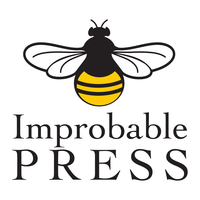
Write what you know.
Before I get to the debate I had with award-winning crime novelist Natalie Conyer on the ridiculous advice above, I'm flapping my arms over a lovely example of why you should write what you don't know: Úna Woods' Have You Seen the Dublin Vampire?
Look at that cover! People rushing across Dublin's Ha'penny Bridge, while a glorious vampire in full regalia stands in their midst. Why I find this book a sweet encapsulation of write what you don't know (while building from what you do) is that Woods set her story in and around Dublin – what she knows – and wrote about what she couldn't possibly know since they're not real: vampires.
Just as Irish woman Sarah Maria Griffin set Spare and Found Parts in Ireland, then wrote about a girl building a boy from scratch. Just as Ray Bradbury grew up in little Waukegan, Illinois, then wrote about sentient mushrooms taking over a small town, writing what you know is a foundation.
It never, ever has to be the whole house.
‡
Natalie Conyer: ‘Write what you know’ has to be the worst advice ever given to an author because it denies the existence of the very thing that makes art: the ability to enter an unknown world and bring that world to readers, viewers and listeners.
More
Writing That Second Book: From Triumph to Tedium Back to Triumph
Super Secret Tips For Getting Your Short Story Published
Three Trick Questions About 'Cheating'
If we only wrote what we knew we wouldn’t have 20,000 Leagues Under the Sea, the witches in Macbeth, and (god forbid) Game of Thrones. That’s not to say those works don’t draw on human experience but they exist because their creators went outside their own lives and into imagined realities.
I’d like to replace ‘write what you know’ with advice someone once gave me: ‘Write your dream. After you’ve written, check it. Research if you have to. Make sure you’ve got cultures and people right. Edit. But stay true to the dream.’
Atlin Merrick: 'Write what you know' is bonkers advice. Write what you know to me means build from what you know.
I don't know what it's like to be a werewolf in love, but I do know about the fast thrumming of an excited heart, the giddiness of desire, the sense of freedom when I run. When I write, I can weave these things I know into what I don't, so that a reader can understand my besotted wolf as she excitedly awaits her paramour.
Write what you know means reading about Deaf culture if I want to write about Deaf culture, it means asking Deaf people if I got it right. It does not mean stay away from telling diverse stories, it means being complicit in empowering the people whose stories I'm telling.
(Read the whole debate on Clan Destine Press' blog.)
